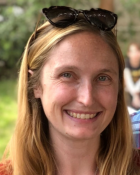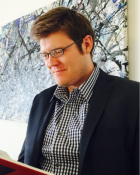
Emily Rosenfelt

Jordan Wallace-Wolf
Many of UCLA’s undergraduate philosophy majors aspire to go to law school and to use their philosophical training in the field of law. A career in law can take many paths, and there are many ways of being a lawyer. To highlight some of these varied paths, we feature short profiles of four undergraduate alumni who are currently lawyers. We hope their stories will inform and inspire those students who dream of a career in law.
All of the interviews were conducted by Jordan Wallace-Wolf. Jordan is pursuing the joint J.D./Ph.D. in our Law and Philosophy Program. He has completed the J.D. and is currently writing a dissertation on privacy. Emily Rosenfelt ’05 is an attorney with the Los Angeles Alternate Public Defender.
JW: Please tell me a little about what you do.
ER: I am a public defender [in] the Alternate Public Defenders Office. I represent people in all different types of felony cases—from child abuse, to murder, to gang cases, to assault and robbery. One of the things that I like about my job is that I spend many, many hours with the people that I represent, just talking to them, not always about cases, but just about life. The prosecutor, the district attorney can’t do that because their job is to follow the evidence where it goes, and then their job is ultimately, if they believe the charges are true, to convict my client. They often have a very shallow view of the defendants. Defense attorneys in general come away with a much more nuanced understanding of who the person is, you see there are these complexities and different reasons for the way people act. And they’re not as black and white as they’re made to seem.
JW: Is there a particular example that you could share?
ER: A lot of my clients have children that they’re very close to, and that they’re good parents of. For instance, in my current trial, and this is all a matter of public record, there are about 14,000 pages of Facebook records that were subpoenaed. The only Facebook records that the prosecutor is focusing on are the ones that suggest that my client is a gang member. However, there’s hundreds and hundreds of Facebook postings of him talking about potty training his three-year-old son, and coaching the flag football game for his 11-year old. You really see that people are not one dimensional, that they have these rich complex ways of being that are not as easy as “bad gang member” and “good contributing member of society.”
JW: How did you get interested in philosophy?
ER: There was this book I found when I was very young, probably fifth or sixth grade, at a used book store, called Ten Theories of Human Nature. I found it just amazing that there were all these different ways that different people and different places had thought about humans, and whether they’re good or bad, or why they act the way they do, how they ought to act. I just thought it was so interesting that there was such differing perspectives on kind of this core question of who we are.
JW: What area of philosophy did you mainly study?
ER: I took all the required courses—logic, and history and all that. I particularly liked ethics and moral philosophy. That’s probably why I became a public defender, is because I felt like all of the very important questions I was studying in moral philosophy, they were very interesting, but I felt like I needed to engage more with moral philosophy on a practical level. Representing people accused of very serious things, is kind of practical philosophy, a sort of moral philosophy in action. I’m taking a lot of my beliefs that I have about the dignity of every person, the right of every person to be heard and viewed fairly, that I feel like I’ve gained from studying philosophy, and using that in my work and my daily life.
JW: Did these ideas about the right of every person to have representation and to get a fair trial push you towards criminal work as opposed to other potential civil areas where people need representation? The stakes are very different.
ER: You hit the nail on the head when you said the stakes are different. Often in moral philosophy you’re dealing with these thought experiments that involve these very heavy situations. To me, those questions and those thought experiments were more interesting than some other areas of philosophy that I studied. That’s probably why criminal law is more interesting to me than some of the other areas of law I could have gone into.
After I graduated from UCLA, I worked for Teach For America. I was assigned to the Mississippi Delta in Arkansas, to teach second graders. The town that I worked in was very segregated still in 2011-2012. All of the students in my class were poor and Black. So many of them had parents that had been very negatively impacted by the criminal justice system. It was heartbreaking to me to see these little seven year olds already at such a disadvantage compared to, at least in this town, their white peers. “Oh my goodness,” I thought, “I want to try and be on the other side of this and try to help.”
“Representing people accused of very serious things, is kind of practical philosophy, a sort of moral philosophy in action.”
JW: Did philosophy affect your approach to teaching?
ER: One of my favorite professors at UCLA was Barbara Herman. She had a very amazing way of making each person feel fully heard in her classes. Even if one or two people dominated the discussion, she was very good about making sure that each person had time to say what they wanted to say, and felt heard and understood. And I tried to do that with my second graders, I did my best. Another way philosophy impacted my teaching is that I went into it thinking of them as little moral beings capable of all these different ways of behaving, and fully capable of thinking about the motives for their actions and why they do what they do. That really helped me. I didn’t just see them as noisy little children, I thought of them more fully.
JW: A final question. Is there anything about philosophical study that has changed your daily life in some way? The way you relate to something that you do or what you read?
ER: I think I see things with a broader perspective than I would, were I not to have studied philosophy to such a degree. I have had clients that have been sentenced to prison for life. And that is very hard. But, having training in philosophy, I know there are a lot of philosophers who lived whole lives in monasteries, or who lived [a] very cloistered life in one small town and took a walk each day and that’s it. There are still ways to live a meaningful, important life even in difficult conditions, meaning even if you’re in prison for life. I’ve tried to convey that idea to the clients that I’ve had that have been in that situation, because I really believe it. Reading philosophers can actually help with that. Several times in the past I’ve bought different philosophy books for clients at their request, and I think it helps for them to have it brought into perspective that my life is not over just because I’m in here. I still have my mind, and that can still to some extent, give me freedom.



